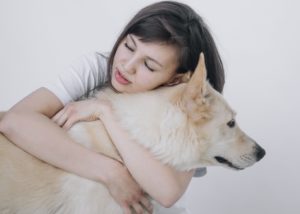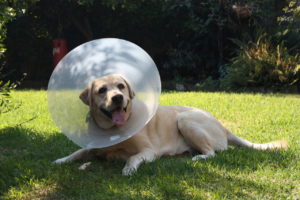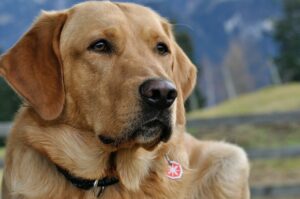So you decided to add a new family member, congratulations! But getting a new puppy requires special care, just like a human baby does. Ideally, you got your puppy while he or she has reached 3 months of age. If sooner, caring for your new puppy will be even more demanding. But here are some general tips to help you get through it all as puppyhood will greatly contribute, not to say determine, your dog’s general health throughout their life.
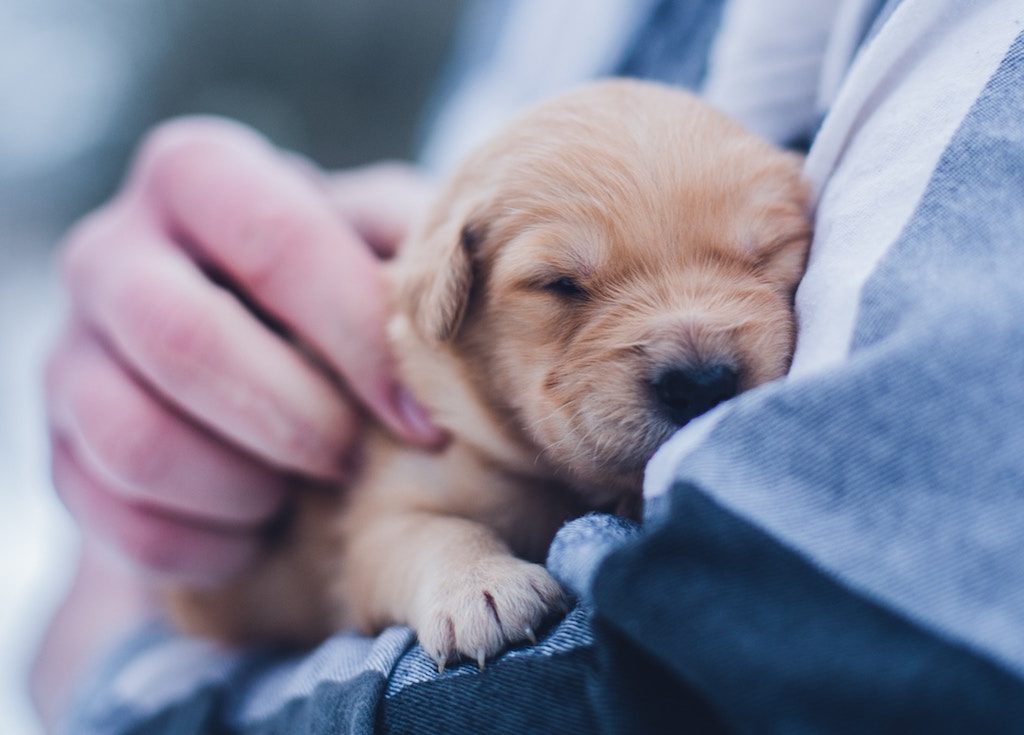
Caring for your new puppy
Maybe your puppy has found you and you have the opportunity to make such an inspiring difference in its life (and get so much love in return). Or you chose your puppy by carefully browsing through the different breeds. There are also mixed breeds, i.e. a Yorkie/Puddle mix, a furry little creature that will have you melting from cuteness overload! But whichever way your puppy has arrived, once your new puppy dog enters your home, you can count on several things. They are unlimited joy, cleaning after your puppy and spending a LOT of time teaching your puppy how to behave.
Milk
Your dog will be a puppy until it reaches 1 year of age. Puppies thrive on their mum’s milk but they should never be given cow’s or goat’s milk as it can cause them stomach disturbances. And you most certainly want to avoid diarrhea which can cause the poor puppy to dehydrate. The greatest dangers for puppies are diarrhea and vomiting. So, unless the puppy is not with its mother for some reason for the first two months, you need to help the poor baby survive.
Luckily, there are many commercial milk formulas in powder form that are formulated to fulfil a puppy’s needs. You start by boiling water and then letting it cool to 70 degrees Celsius (158 F). You add the powder mixture and follow the manufacturer’s instructions. After blending by swirling the bottle and shaking it up and down. Lastly, let the formula cool to 37 C (98 F) before you feed it to your pup. After the puppy is three months old, it is fine to switch to commercial puppy food until it reaches its adult size, which is usually at 1 year old. For larger dogs, it sometimes takes up to a year and a half.
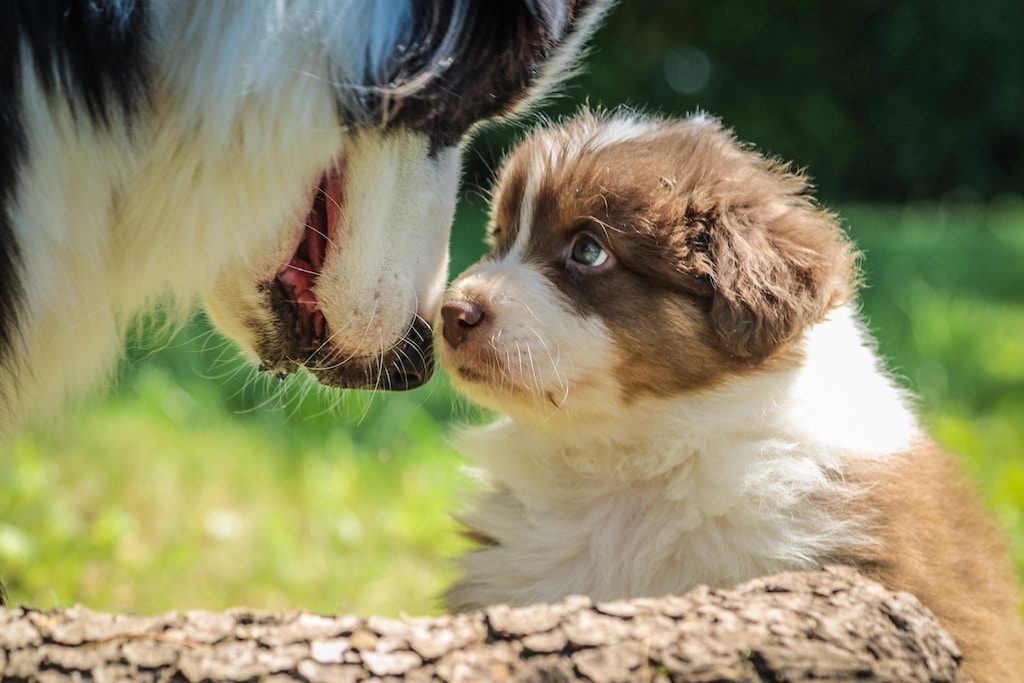
Health – immunisation
Puppy vaccinations are key for your dog to live a long a healthy life. Vaccinations have made immunisation so much easier as they are medically shown to prevent a ton of life-threatening diseases. Your puppy’s vaccine schedule will look somewhat like this:
- 6-10 weeks: DHPP, Kennel Cough vaccines
- 11-14 weeks: DHPP, Leptospirosis, Canine Influenza vaccines
- 15-16: DHPP, Leptospirosis, Canine Influenza, Rabies vaccination
Your dog will need to be vaccinated against diseases and rabies once per year throughout its life. Then there’s the flea and worm treatment that will last throughout your dog’s life. You need Drontal every 4-6 months for your dog’s intestinal tract to be free of parasites. Then, there’s NexGuard (chew pill) or Advantix (spot on) for fleas and ticks. These are monthly, yet you also have 3 month options like Bravecto. Some owners also opt for collars. And there is the heart-worm prevention: Spectra, Milbemax or Interceptor monthly pill, or the Guardian injection that will keep your dog protected from this mosquito-transmitted danger for 6-8 months.
Red flags to look out for – time is of essence!
Don’t forget about the importance of regular vet visits for your dog’s general health when you can ask your vet for more details.
When it comes to puppies, it is also very important to make sure to watch for early signs of illness:
- Lack of appetite
- Underweight
- Vomiting or diarrhea
- Swollen abdomen (not to mention painful!)
- Lethargy or any sort of tiredness – puppies should be bounce-full!
- Respiratory difficulties (nasal discharge, coughing, difficulties breathing)
- Eye issues (redness, discharge…)
- Any difficulties peeing or pooping
When it comes to insurance, the opinions differ. It surely makes you sleep with more ease, and if you do need the vet more often, it will pay off. Yet, some owners find that it’s just calling for trouble and that in some cases, it is just an avoidable expense. It’s up to you.
Food
So, after your puppy is 3 months old, it is of great importance to switch to a quality puppy food. This food is more rich and nutrient-dense than that for adult dogs. After you choose the brand and advise your vet on the topic, a strict feeding schedule is a must as puppies start eating up to 4 times a day, and then decrease the frequency to one or two times per day max as time goes by. Puppies are fed more often to avoid a drop in their blood sugar. Usually, the schedule goes something like this:
- 8-12 weeks: 4 meals per day
- 3-6 months: 3 meals per day
- 6-12 months: 2 meals per day, slowly moving to 1.
Last but not least, keep in mind that some foods that are ok for us are highly toxic for dogs. Make sure that a list of all the toxic foods that you should never give to your puppy is always near you, at least until you know it by heart.
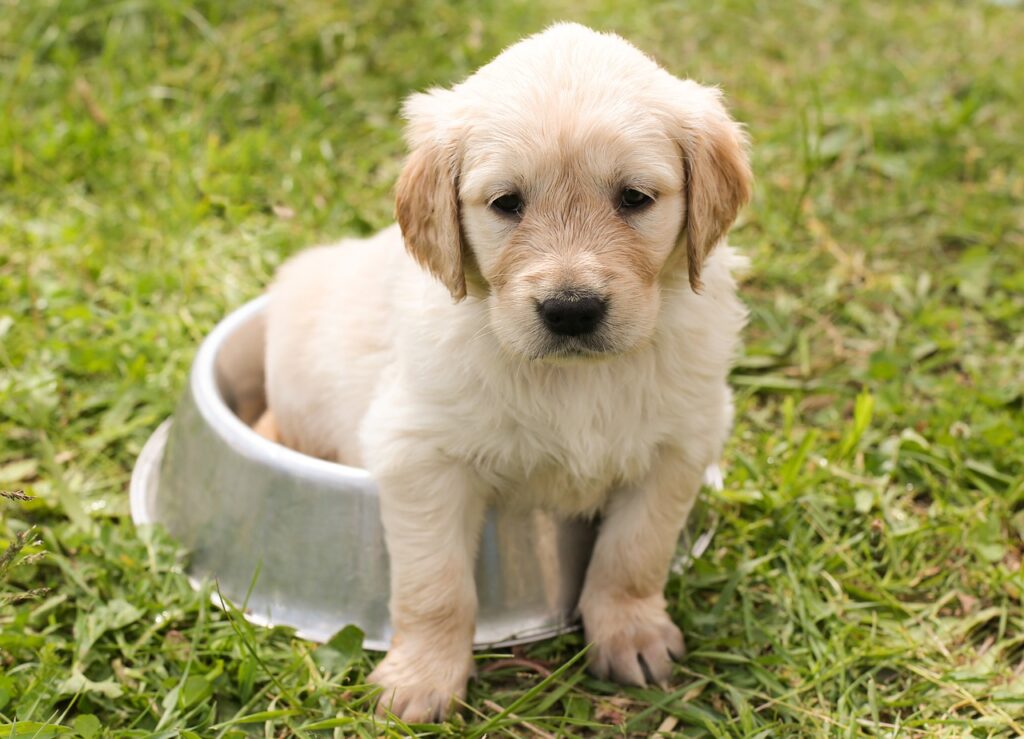
Shopping list
Let’s divide the essential puppy supplies into three categories:
a) items that you will have to replace when she grows up;
A collar or a harness. If you have a small breed puppy, don’t get the smallest bag in the shop as your pup will most likely outgrow it, unless it is a Chihuahua! But every puppy will outgrow its winter or raincoat… they just grow in a speedy manner :)
b) the favourites that she can use even after she grows up!
There are the basic dog essentials that can literally be all that you need. A rope bone settles it all. Maybe your pup is also a fan of balls. Treat balls especially! These simply never go out of style. Also, you need some outside essentials, like a water container, poop bags, shampoos, conditioners, tooth brush and tooth paste, paw balm, etc.
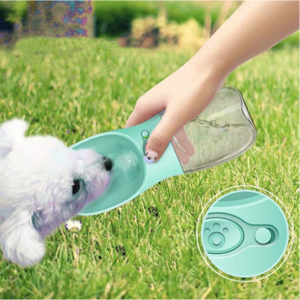
c) those that you have to wait for until she grows up.
More creative toys that require some thinking, i.e. treat ball might need to wait for a while. The good news is, that when your puppy grows up, it will be less fond of your socks, underwear and shoes!
Sleeptime
This period of growing and learning is also tiring so make sure you let your puppy rest well. Your puppy surely has a ‘safe-blanket’ of some sort – make sure it is available at all times.
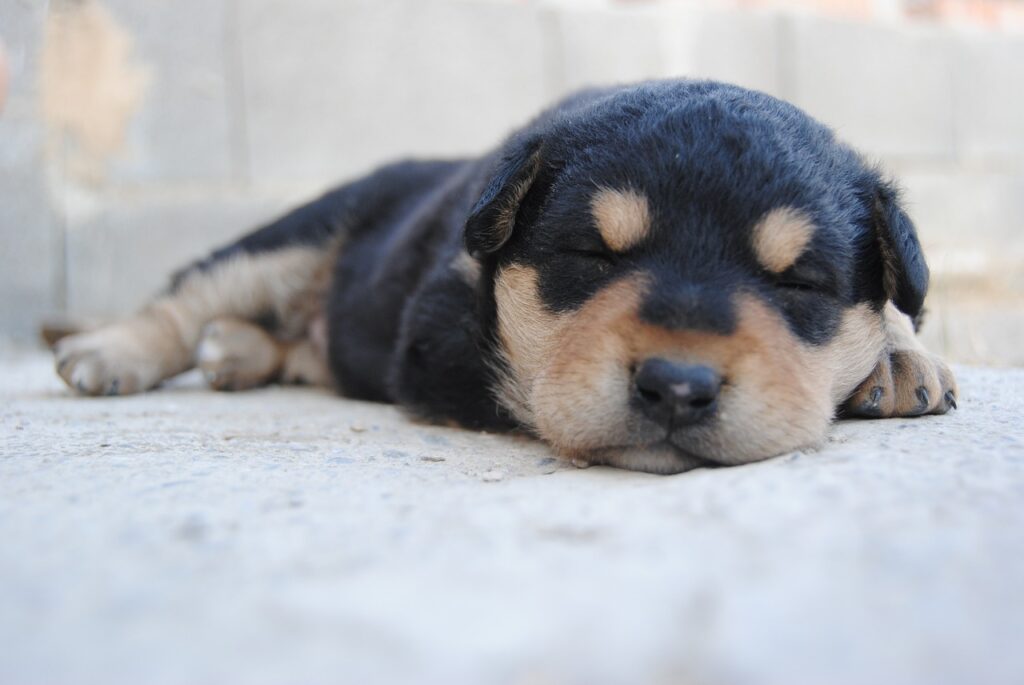
Poop business
Puppy potty training takes a lot of patience above all else. It requires a precise schedule that you must stick to. Some dogs learn quicker, others achieve the goal in a slower pace. It’s entirely individual and although we understand the importance of your puppy getting this right ASAP, any sort of pressure (not to mention yelling) will only slow down the process and confuse your puppy even more.
Training time
A happy dog is a well-trained dog. Training will also further deepen the bond between you two. Start from basic obedience training and slowly move forward as your puppy adopts the commands. This can be a fun and enjoyable process for both of you. The rules are:
- be patient and consistent
- start training your puppy as soon as possible (immediately!)
Playtime
Just as teaching your dog some basic obedience commands is important, so is playtime. And there are countless ways to creatively entertain your dog. The only rule is that there are no limits! Some trainers even teach dogs to use smartphones, not to mention the actual help dogs can be of to people with disabilities, etc. So feel free to fly on your creativity wings when it comes to playing with your dog! Just like with humans, play is the secret to easy learning :)
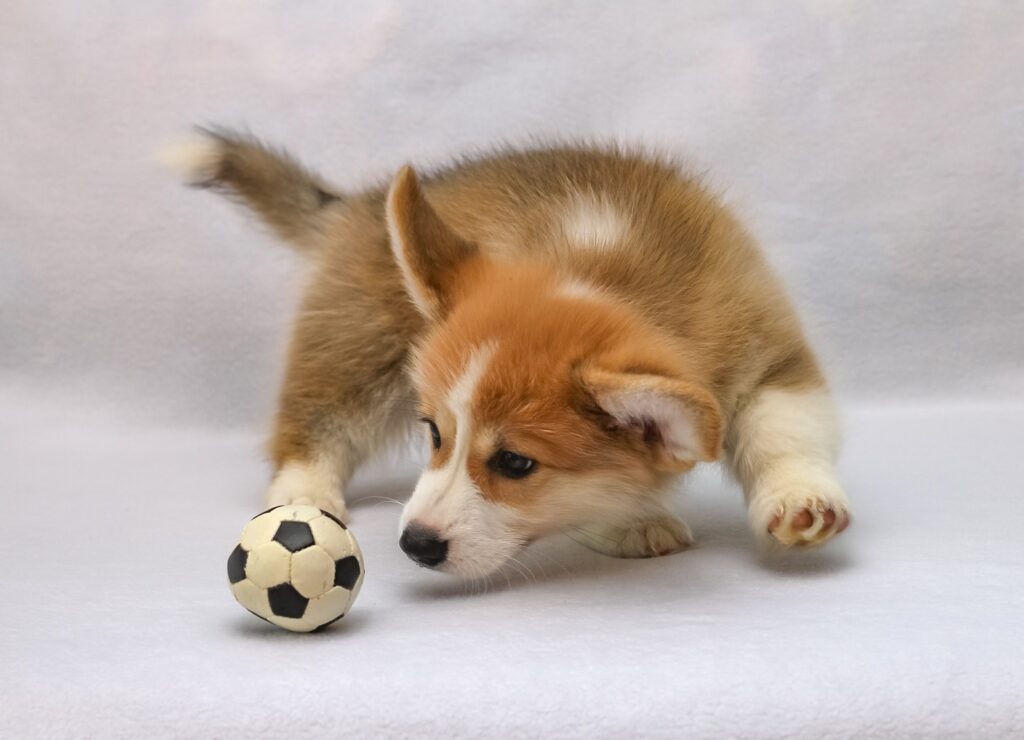
Dog-proofing your home
Getting your home ready for a puppy is very important for your dog’s safety. But dog-proofing will also save your precious furniture and generally, all your belongings.
Puppyhood journey – the goal
So, you will bring your new furry friend home after it is about 12 weeks old. Although the puppy still needs to be isolated, it is a good idea to start socialising but only with healthy and fully vaccinated dogs! Once your puppy is fully vaccinated, it can socialise outside with any dog! Also, it is a good idea to start with basic training and start leaving your puppy alone for short time intervals so you can avoid any sort of separation anxiety in the future. After your puppy is 6 months old, you can slowly start with advanced training and revise on your current progress to make the necessary amendments.
Don’t forget to enjoy every minute of your puppy’s puppyhood – they do grow up so fast, not to say too fast! And ultimately, the amount of love, effort and affection you devote to your puppy is so much more than just a good investment. Devotion to this routine will pay off, to say the least. And by keeping your puppy’s experiences positive, from day one, you are actually helping your puppy grow into a confident adult dog, making life more enjoyable and happier for both of you.

